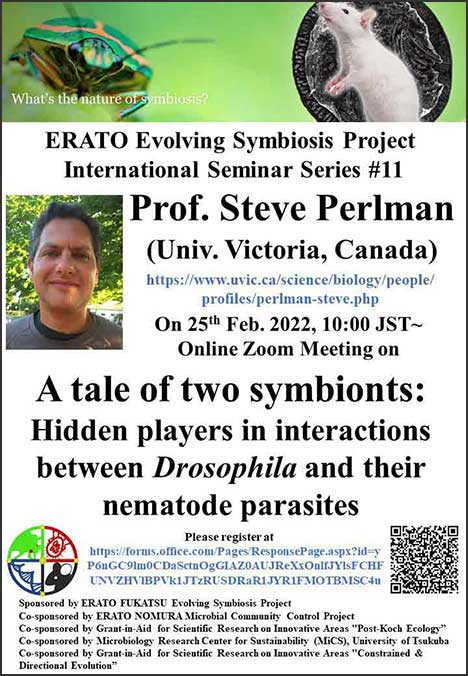ERATO Evolving Symbiosis Project International Seminar Series #11
Prof. Steve Perlman (University of Victoria, Canada)
“A tale of two symbionts: Hidden players in interactions between Drosophila and their nematode parasites”

Abstract: Multicellular organisms commonly harbour microbes that protect them against natural enemies, and these defensive symbionts are important players in host-parasite evolution and ecology. On the other hand, natural enemies themselves may employ microbial symbionts that help them to successfully infect hosts; these types of symbioses have generally received less attention than defensive ones.
We have been studying how beneficial microbes affect interactions between Drosophila and their natural enemies. In particular, Drosophila are infected by diverse parasitic nematodes that vary widely in virulence and host specificity. We have found that D. neotestacea, a common N. American woodland species, harbours a maternally inherited bacterial symbiont called Spiroplasma that protects it against the virulent sterilizing nematode, Howardula aoronymphium, and that the benefit conferred by Spiroplasma is so great that symbiont-infected flies have replaced their uninfected counterparts across the continent. Protection appears to involve toxins called ribosome-inactivating proteins (RIPs). Spiroplasma genomes encode a diverse repertoire of RIP toxins, and we speculate that toxin
diversity and evolution play an important role in specificity against different enemies. Finally, we have also recently found that Howardula nematodes have themselves recently acquired a bacterial symbiont that is allied with a lineage of plant-pathogenic bacteria, and we speculate on this symbiont’s role in infection and nematode fitness.
ERATO Evolving Symbiosis Project International Seminar Series #11
Sponsored by ERATO FUKATSU Evolving Symbiosis Project
https://www.jst.go.jp/erato/fukatsu/english/
Co-sponsored by ERATO NOMURA Microbial Community Control Project
https://www.jst.go.jp/erato/nomura/en/index.html
Co-sponsored by Grant-in-Aid for Scientific Research on Innovative Areas "Post-Koch Ecology”
https://postkoch.jp/about/
Co-sponsored by Microbiology Research Center for Sustainability (MiCS), University of Tsukuba
https://www.mics.tsukuba.ac.jp/en
Co-sponsored by Grant-in-Aid for Scientific Research on Innovative Areas "Constrained & Directional Evolution”
http://constrained-evo.org/english.html


